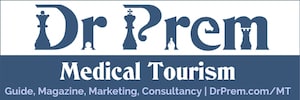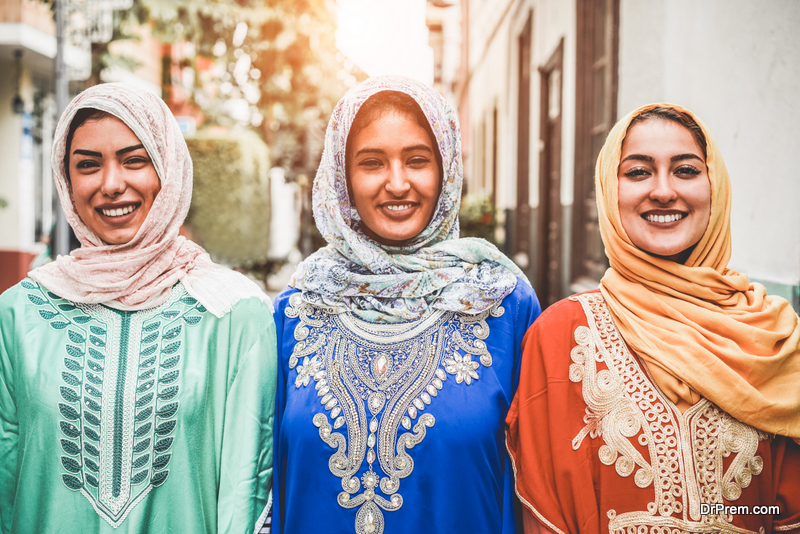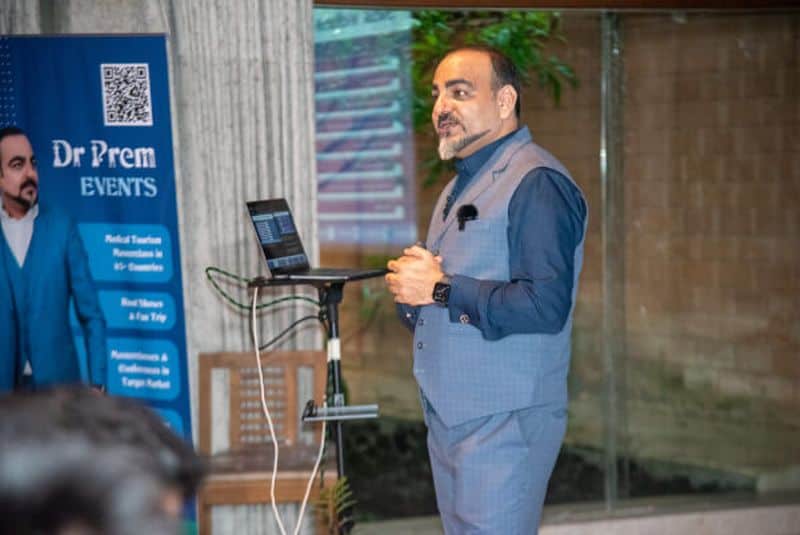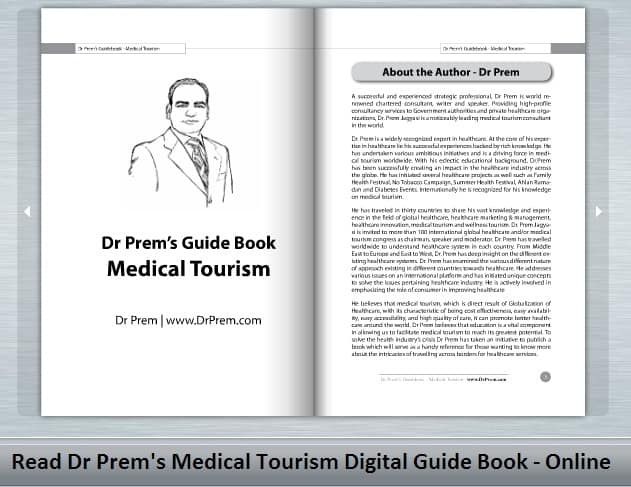Crossing borders for quality healthcare might be a better option but navigating cultural issues in medical tourism is critical to creating a seamless and pleasant patient experience. Providers be it facilitators or facilities or agencies, should have cultural competency to deal with culturally diverse patients effectively.
Cultural competency fosters an empathetic and welcoming environment where every patient feels seen, heard, and valued. Providers investing in culturally sensitive support and care plans always have an edge over others.
Patients too need to understand the cultural traits and practices of a medical tourism destination before finalizing it. Cultural issues in medical tourism go beyond traditional customs, beliefs, and etiquettes to specific clinical practices that influence patient’s healthcare decision-making.
This medical tourism guide is your vital compass equipping medical tourism businesses, facilities, and patients with essential knowledge and tools to navigate this complex terrain for enhanced outcomes.
Guide To Understanding Cultural Issues In Medical Tourism-Insights By Dr. Prem
-
Cross cultural issues commonly faced by medical tourists
-
How to develop cultural understanding of patients in medical tourism?
-
Cultural understanding facilitates bonding between patients and the provider
-
Identifying the probable areas of conflict
-
Strategies to develop cultural understanding of patients in medical tourism
-
Healthcare organizations
-
Create proper facilities based on the patients’ cultural needs
-
Catering service
-
Medications
-
Arranging spaces for religious practices
-
Maternity and female care
-
Declaring death
-
Medical Tourism facilitators
-
Strategies for prospective medical travelers
-
Respecting another culture’s dress code when abroad for medical tourism
-
Language and cultural barriers that you may face during a medical trip
-
Getting a grip on cultural and ethical issues in medical tourism
-
Language and cultural barriers
-
Ethical issues
-
Being in the know of destination culture and language can be a huge plus
-
Consider the cultural issues
-
Religious and National Holidays
-
Clothing
-
Food and water at the destination
-
How Dr Prem & Associates can help you?
Investigating and gathering all-important information about the region you are visiting could be very useful as you might come across many differences between the cultures of the home country and the host. These cultural differences may or may not suit you and might make many changes to your desired or planned medical journey. In this article, we will discuss about the various factors a medical tourist needs to take into consideration:
- In medical tourism, the understanding of cultural issues is a two-way process. The host country needs to be aware of the patient’s cultural beliefs and a potential medical tourist should understand the culture of the destination country.
- Most medical tourists are traveling across the boundaries to receive quality medical or wellness care at affordable prices, there is a great need for the two-sided cultural understanding. The diversity in culture may occur due to the differences in geography, nationality, ethnicity, race, religion and language.
- The religion, clothing, food and lifestyle play an important role in understating the cultural values of a particular region or a country. The cultural needs of people varies religion to religion for example, cultural needs of a Muslim patient could be entirely different from that of Hindu and Christian patient.
- A clear and complete understanding of the cultural values and beliefs can help achieve higher satisfaction. As patients coming from different geographies may have varied cultural beliefs. Therefore, it is very important for them to understand the value and cultural beliefs of their medical tourism destination.
Cross cultural issues commonly faced by medical tourists
Medical tourism has become a very sought after industry in the last few years. The number of medical tourists visiting developing nations like India, Singapore, Malaysia, Mexico and the UAE has also been increasing steadily over the past few years. Most medical tourists solely rely on medical costs when deciding the destination for their treatment in the past. However, a recent trend has noted many medical tourists today also take the cultural diversity of the region into consideration, when opting for a medical tourism destination.
The reason for this can be attributed to the culture shock many medical tourists experience when visiting certain foreign destinations for treatment. Visiting a culturally familiar place seems like a more comfortable option for these patients. As a result, it would be possible to see British patients visiting India for medical care while American medical tourists prefer Mexico for their treatments. And the Chinese prefer Taiwan for their medical treatments over other Southeast Asian countries.
Most medical tourism providers generally do not indicate about the cultural differences a patient might experience in the destination country. This would result in the medical tourist experiencing a culture shock in the provider country, irrespective of whether a company representative is there to help him/her or not.
Patients with little understanding of the local languages spoken in the provider country would not be able to communicate effectively with the medical personnel. Doctors on their part would not be able to understand the patient properly enough in order to diagnose the condition. This could lead to misdiagnosis and inappropriate treatment, which in some cases can turn out to be fatal for the patient.
Cultural beliefs vary from region to region. For instance, it is customary for Muslims to fast from morning to evening during Ramadhan. They would not consume even oral pills while fasting. Muslim patients also prefer to be treated by doctors of the same sex; for instance, a female patient would want to be tended by a female doctor and likewise. They also insist on absolute privacy during treatment. In case a Muslim patient fails to communicate this beforehand or if the doctors at the facility do not adhere to the beliefs of the former, it would cause unnecessary hassles to both the patient and the doctor.
Different cultures would lead to different lifestyles and customs. This would in turn lead to the rise of regionally specific diseases. The way these diseases are perceived varies from culture to culture. Therefore, it would be quite possible for a doctor in India to brush off influenza as just another normal disease while the patient considers it a rare disease to which he/she is not naturally immune to. This would apply for medical tourists traveling from the Western countries to tropical regions for treatment.
Considering all these factors, it is deemed necessary for medical tourism providers to educate their clients about the cultural values of the place they choose to visit. Health care providers at the destination would also need to work on cultural competence in order to treat culturally diverse patients equally.
How to develop cultural understanding of patients in medical tourism?
In medical tourism, cultural similarity is a significant determinant in destination selection. People try to avoid cultural shock. This is one of the main reasons Americans prefer Mexico and Muslim travelers most often choose GCC and Middle East countries with advanced medical facilities. Koreans residing in New Zealand fly to their motherland for medical assistance a trend also prevalent among Dominicans residing in the US.
It is to be noted that preference for cultural similarity is mainly driven by religion, language and long-standing societal customs and practices. Few research reports have spotted significant differences in cross-cultural perceptions among Chinese, Japanese and Korean medical tourists in destination selection, inconveniences and preferred treatments. Studies also support cultural similarity as an important factor for international patients preferring Iran.
Geographical proximity is also another important factor impacting the decision-making of medical travelers which often gets linked to cultural similarity. Malaysia is a bright example of being highly-favored by travelers from Islamic countries along with others.
Cultural understanding facilitates bonding between patients and the provider:
Understand the patient first, next his ailments. Unless the patient-provider compatibility builds, proper healthcare assistance cannot be delivered. Destinations enjoying top ranks in the global medical tourism index have prioritized developing a cultural understanding of patients along with providing world-class treatments and assistance.
Cultural understanding and appreciation is ought to be a bilateral process but given the vulnerable condition of the patient, the onus is more on the providers. They should go extra miles to build rapport with foreign patients.
Amidst cultural compatibility:
- Patients find easy to open up to the physicians by communicating in their mother tongue.
- Physicians can be prompt in diagnosis and setting the treatment plan.
- Patients get the feel of being duly respected and feel at home.
- They have the comfort that their cultural and religious requirements will be met.
- Trust builds
Identifying the probable areas of conflict:
Modern medicine has brought immense benefits to mankind but it hasn’t been successful enough to bridge all the gaps within society. Diverse global cultures and traditional practices have a strong impact on peoples’ health beliefs and medicinal practices.
This goes a long way in shaping up the cultural outlook of patients towards medical treatments. While things may remain apparently fine when these are confined within a geographical region or communities, conflicts arise when patients step out of their cultural habitat. Cultural shock is inevitable.
Cultural conflict is mostly seen in:
- Communication owing to language barriers
- Differences in medical beliefs
- Marked differences in medical procedures and applications. Preference for same-sex medical care and attendance is common.
- Dress code
- Decision making by males and females.
- A multidisciplinary approach to treatment involving physicians, specialists, nurses, attendants and other paramedical staff creates confusion among patients.
- Etiquette and behavior
- Diverse food habits
- Religious practices
Strategies to develop cultural understanding of patients in medical tourism
Healthcare organizations:
- Build a list of different cultural backgrounds of patients visiting frequently.
- Hire professional interpreters to ease out the communication process. They should display the eagerness to help and be modest in behavior.
- Study thoroughly their traditions, practices, medical beliefs and etiquettes. Make a note of their likes and dislikes as well.
- Create a video presentation highlighting all services both medical and non-medical, facilities, facilities and staff available and send it to the medical travelers prior to their visit.
- Grow cultural empathy. Show respect to the patients’ culture even if they seem to be weird. This should be practiced by all staff handling foreign patients.
- Provide proper training to staff regarding handling international patients.
- Have patience even if the patient seems to be irritably nagging. Understand their vulnerable situation as they have traveled to an alien land seeking help.
- Have a keen watchful eye. Observe the patients’ body language and approach. Are they in hesitation?
- Grow a comfort zone by asking about the patient’s background and family without infringing on his/her privacy.
- Stay non-judgmental regarding any information passed by the patient. This may carry a different value from yours.
- Follow the suggestions and advice of patients regarding maintaining proper communication with his/her family members or companion.
Create proper facilities based on the patients’ cultural needs:
Catering service:
Food habits vary with person and culture. It doesn’t remain within the simple classification of vegetarian or non-vegetarian. Even ambiguities exist between veg and non-veg food items. Hospitals/clinics must be aware of the choices and make suitable arrangements. Certain food items may be detested by medical travelers hailing from specific cultural backgrounds. During fasting months, people following a specific religion may consume specific food items at specific times of the day.
Medications:
Alcohol-based medications may not be accepted by followers of Islam. During Ramadan, they may not be willing to consume oral medications.
Arranging spaces for religious practices:
People resort to god in times of distress. Praying several times a day is a regular practice for the followers of Islam. Arranging proper spaces to carry out basic rituals enhances patients’ comfort.
Maternity and female care:
Medical tourists may seek to perform certain traditional birth rituals before and after delivery. Make provisions for these if possible without causing any harm to the mother and baby. If there is any safety concern, it should be explained politely to the patient party.
Declaring death:
- This is the most unwanted situation but it may happen. Utmost care should be taken in declaring the death of the patient. One should take cognizance of the cultural and socio-economic background of the patient party while making this declaration. The patient party should be treated with enough sympathy along with offering proper consolation.
Medical Tourism facilitators:
The level of cultural understanding is tested the moment a prospective medical traveler approaches a facilitator. It may be a short email or a brief telephone call. Addressing the prospective patient respecting his/her cultural background is the first step in rapport building.
Most of the points discussed above are applicable for medical tourism facilitators as well. Additionally, they need to put in efforts to select the right persons and partners in the network to provide the best service and support fitting the patients’ cultural needs. A person well versed in Arabic and Islamic culture can serve as the liaison officer to handle patients from Arab nations and the like.
Strategies for prospective medical travelers:
Globalization of healthcare has offered you a great opportunity to access world-class medical treatment in your choicest destination. You get an exposure to explore a land and culture, which may be entirely different from your motherland. Instead of getting bewildered, adopt a few strategies to accept cultural differences sportingly and get the best outcome of your venture.
Respecting another culture’s dress code when abroad for medical tourism
You might be used to wearing anything that suits you in your home country, but do take into consideration that every country has a certain dress code and usual attire. Some places are more conservative than others, so in order to avoid offending the local people, do a quick search on how the local population dresses in that nation.
For example, certain Middle Eastern countries such as Iran or Saudi Arabia require visitors to be completely covered (including head scarves) in public locations, otherwise it is considered extremely offensive.
Other important strategies to overcome cultural barriers:
- Be open-minded. Do not carry any preconceived notions likely to influence your logical analysis.
- Get aware of the basic culture and etiquettes of the destination country. Consult your medical tourism facilitator.
- Check that your medical facilitator is also aware of your cultural background.
- Look for the destinations with cultural similarities of yours but always weigh other vital criteria too. Nothing can be better if the destination speaks and understands your language.
- If you fear language will be a problem, seek for an interpreter well ahead.
- Maintain politeness with everybody you interact.
- Be compliant with the medical norms and cooperate with physicians, attendants and other staff. Understand they too are trying to give you the best support.
- Every healthcare organization runs on specified rules and regulations. Maintain discipline by abiding with these rules. If possible, get an idea of these regulations beforehand.
- Follow the dress code and customary etiquettes of the destination country.
- Check the food habits of the country. Common staple dishes may not be palatable for you.
- If you have special dietary needs, inform your medical tourism facilitator or the hospital well ahead.
- Be cautious in word usage. Some words may be considered offensive in the destination country.
The good thing is modern travelers are well-informed. Developing cultural understanding largely depends on the intent of both the provider and the patient. It is a well-nurtured practice that ultimately leads to enhanced patient satisfaction, lesser medical errors, better treatment outcomes and more patient referrals.
Language and cultural barriers that you may face during a medical trip
If the native people of your chosen medical care destination do not speak or understand your language, then you can face problem while obtaining the accurate information, which is necessary for you. It will also take you in such situation where you are not able to ask the relevant questions and the healthcare service provider fails to answer as well as provide you with the right information or treatment.
The possibility of medical traveler facing cross culture misunderstanding is also as high as it gets. To avoid these, a medical traveler should avoid traveling to medical tourist destinations that do not speak and understand his language. On the other hand, if you wish, you could hire a translator or companion, but hiring them will make you to spend more. Having no other choice than visiting a foreign country or region that does not speak and understand your language, you should consider this option and be ready or prepared to add more amount to your overall treatment.
Apart from this, the medical care destinations and facilities catering these services should make all possible efforts to include required resources for the purpose and even offer a translator to make sure that the patients get the authentic information. It will help them make a knowledgeable decision concerning a responsive an issue as their health is.
Additionally, the healthcare service providers should also be well conscious of the cultural competency and include these to their treatment policies to shun any problem arising due to this. Patients should also know the basics and should try to understand the culture of their destination country to make their experiences as medical tourists as pleasant as possible.
As a medical tourist, you have to face many problems when in a foreign land. Cultural and language barriers are one of the biggest problems, which can put you in an awful situation. The best way to overcome these types of situations is to select a destination where people can talk and understand your language.
Getting a grip on cultural and ethical issues in medical tourism
The chance of a medical tourist facing cross culture misunderstanding is also as high as it gets. To avoid these, a medical tourist should avoid traveling to medical tourist destinations that do not speak and understand his/her language in the first place.
Language and cultural barriers
Language issues and cultural barriers are formidable challenges in the medical tourism sector. If the people of the destination country do not speak or understand the language of the medical tourist, obtaining the accurate information can be fairly difficult. It also lands you in a situation where you find yourself unable to ask relevant questions and the healthcare service provider fails to provide you with the right information.
On the other hand, if you wish, you could hire a translator, but hiring one will mean you spend more. Apart from this, the medical tourism destinations and facilities catering these services should make conscious efforts to include resources required for the purpose and even offer a translator to ensure that the patients get accurate information. It will help patients make an informed decision regarding an issue as sensitive and important as their health.
The healthcare service providers should also be well aware of the cultural competency and include these to their treatment policies to avoid any hassles arising due to this factor. Patients should also know the basics and try understanding the culture of the destination country to make their experiences as medical tourists as pleasing as possible.
In several instances, important documents, healthcare reports, patient history, and other documents of the tourist might be in the native language of their country. This can pose a problem in case the native country and destination country do not follow the same language. A (relatively) small expense on medical transcription would be very useful in dealing with such a problem.
Ethical issues
The concept of medical tourism also revolves around many controversial ethical and moral issues. Seeking legal protection in such a situation is difficult, time consuming and expensive in a foreign country. It becomes practically impossible for a medical tourist to come out of this difficult situation.
Further, there might be issues like some medical tourist seeking an organ transplant at a foreign location for reasons like the facility is not available in his/her home country or there are long waiting times that might affect his health adversely. In such a case, the patient is left with no other option but to choose a medical tourist destination for organ transplant.
This also has the power of making things appear suspicious, and could be tempted to the folly of illegal organ trade. As with other scenarios, government organizations take such procedures very seriously, and put minute scrutiny on such operations. It would be extremely unlikely for a patient to be caught up in something as heinous as illegal organ trade.
Being in the know of destination culture and language can be a huge plus
Consider the cultural issues
Researching the culture of the region you are visiting could be very useful, as you might encounter many differences between the cultures of the home country and the host. These cultural differences may or may not suit you. Let us discuss various factors a medical tourist needs to consider to get a general idea of another culture’s predispositions.
A clear understanding of the cultural values and beliefs can help achieve higher levels of satisfaction. Since patients coming from different geographic areas may have diverse cultural beliefs, it is important for them to understand and value the cultural beliefs of their medical tourism destination.
Religious and National Holidays
Every country has its own list of official, national and religious holidays. Therefore, it makes great sense to search for the list of national and religious holidays in the particular country you are visiting before you embark on your medical journey.
The celebrations in the country you are visiting could have an effect on your travel plans, as many hospitals, banks and stores will remain closed. In addition, it might be important to understand a few aspects of the host country’s religion prior to traveling, so that you do not have to face any cultural shocks when you reach your destination.
More importantly, if you are not aware of the cultural matters of your medical tourism destination, you might get into trouble with the law. For example, during the period of Ramadan in Arab countries, it is not just disrespectful, but illegal to eat, drink or dress immoderately in public places.
Clothing
Clothing laws vary greatly around the world. While some countries have no clothing laws, others have strict laws governing what people can and cannot wear. You might be used to wearing anything that suits you in your home country, but do take into consideration that other countries may have a certain dress code and attire. In order to avoid offending the locals, do a quick search on how the local population dresses in that nation. It is essential to respect the traditional dress code of a particular country in order to create mutual respect and tolerance.
For example, certain Middle Eastern countries, such as Iran or Saudi Arabia, require visitors to be completely covered (including headscarves) in public locations. As a medical tourist, your focus is speedy recovery and you will not want to get into trouble by wearing anything that offends the residents of your medical tourism destination.
Food and water at the destination
When traveling abroad, you should be very cautious about your food and drinking habits. Contaminated food and drink can lead to intestinal illnesses when you travel to some foreign country. Food and water safety is of the utmost importance when traveling overseas. A key benefit of traveling abroad is the fact that you get to enjoy the wide variety of cuisine a particular nation has to offer. While tasting new and local foods in a foreign country seems so inviting, it can also turn out to be a very bad experience if you consume contaminated food and water.
When you travel from one part of the world to another, you will notice a drastic change in food habits. Food is an integral part of any culture, and something that you cannot avoid while visiting any country across the globe. The food available abroad might be entirely different from what you get in your home country and it might be difficult to deny the appeal of the local cuisine. The delectableness of the local street food in a foreign land might be mouth-watering at first, but might cause harm to your stomach.
Some illnesses you can face during your international travel include diarrhea, hepatitis, Typhoid fever, and cholera. Therefore, you must only eat the foods that suit your health conditions. When in a foreign country, you must consider choosing a restaurant or hotel that serves high quality, contamination-free delicacies.
The same rule applies to water as well. Perhaps the rules are even stricter for water. Safe drinking water is the key to good health. If possible purify the drinking water by boiling it. To avoid any water-borne diseases, patients should opt for bottled drinking water, which is easily accessible at convenience stores and markets.
Although it might seem tempting to experiment with different cuisines while on your medical trip, it might be more beneficial to stick to food that is light and bland while recovering from your treatment. Physicians will recommend avoiding food that is high in sodium, fat and spice, and suggest you stick with foods that suit your body and assist in speedy recovery.
Before you begin your medical journey, you should spend some time online to learn about the different types of food available in the country you are visiting. Hospitals should be able to provide you with a menu from the food department, which you can access before you begin your journey to get an idea of the cuisine they serve.
How Dr Prem & Associates can help you?
Dr Prem & Associates is a global leader in medical tourism consultancy. Led by Dr Prem, we have helped many medical tourism businesses worldwide deeply understand cultural issues and expectations for better patient acquisition. Dr. Prem has traveled to 65+ countries and worked with countless global medical experts, healthcare organizations, and medical tourism businesses. From his experience of deep interactions with diverse cultures all over the world, he has helped organizations create culturally sensitive support and care plan boosting patient acquisition and loyalty. Training on cultural competency takes a special position in his curated medical tourism masterclasses putting you on a track of lifelong learning. To know more, book a One-on-one consultation with Dr. Prem.
























